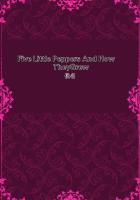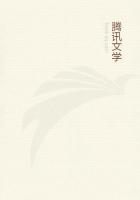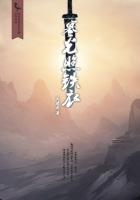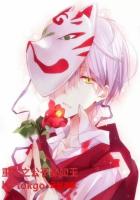Look how they are tormenting him. . . . There's no place for him on earth! He's being driven! . . . Oh, little mother, take pity on thy poor child."All the contradictions of Gogol's character are not to be disposed of in a brief essay. Such a strange combination of the tragic and the comic was truly seldom seen in one man. He, for one, realised that "it is dangerous to jest with laughter." "Everything that I laughed at became sad." "And terrible," adds Merejkovsky. But earlier his humour was lighter, less tinged with the tragic; in those days Pushkin never failed to be amused by what Gogol had brought to read to him. Even Revizor (1835), with its tragic undercurrent, was a trifle compared to Dead Souls, so that one is not astonished to hear that not only did the Tsar, Nicholas I, give permission to have it acted, in spite of its being a criticism of official rottenness, but laughed uproariously, and led the applause. Moreover, he gave Gogol a grant of money, and asked that its source should not be revealed to the author lest "he might feel obliged to write from the official point of view."Gogol was born at Sorotchinetz, Little Russia, in March 1809. He left college at nineteen and went to St. Petersburg, where he secured a position as copying clerk in a government department. He did not keep his position long, yet long enough to store away in his mind a number of bureaucratic types which proved useful later. He quite suddenly started for America with money given to him by his mother for another purpose, but when he got as far as Lubeck he turned back. He then wanted to become an actor, but his voice proved not strong enough.
Later he wrote a poem which was unkindly received. As the copies remained unsold, he gathered them all up at the various shops and burned them in his room.
His next effort, Evenings at the Farm of Dikanka (1831) was more successful. It was a series of gay and colourful pictures of Ukraine, the land he knew and loved, and if he is occasionally a little over romantic here and there, he also achieves some beautifully lyrical passages. Then came another even finer series called Mirgorod, which won the admiration of Pushkin. Next he planned a "History of Little Russia" and a "History of the Middle Ages," this last work to be in eight or nine volumes. The result of all this study was a beautiful and short Homeric epic in prose, called Taras Bulba. His appointment to a professorship in history was a ridiculous episode in his life.
After a brilliant first lecture, in which he had evidently said all he had to say, he settled to a life of boredom for himself and his pupils. When he resigned he said joyously: "I am once more a free Cossack." Between 1834 and 1835 he produced a new series of stories, including his famous Cloak, which may be regarded as the legitimate beginning of the Russian novel.
Gogol knew little about women, who played an equally minor role in his life and in his books. This may be partly because his personal appearance was not prepossessing. He is described by a contemporary as "a little man with legs too short for his body. He walked crookedly;he was clumsy, ill-dressed, and rather ridiculous-looking, with his long lock of hair flapping on his forehead, and his large prominent nose."From 1835 Gogol spent almost his entire time abroad; some strange unrest--possibly his Cossack blood--possessed him like a demon, and he never stopped anywhere very long. After his pilgrimage in 1848 to Jerusalem, he returned to Moscow, his entire possessions in a little bag; these consisted of pamphlets, critiques, and newspaper articles mostly inimical to himself. He wandered about with these from house to house. Everything he had of value he gave away to the poor. He ceased work entirely. According to all accounts he spent his last days in praying and fasting. Visions came to him. His death, which came in 1852, was extremely fantastic. His last words, uttered in a loud frenzy, were: "A ladder! Quick, a ladder!" This call for a ladder--"a spiritual ladder," in the words of Merejkovsky--had been made on an earlier occasion by a certain Russian saint, who used almost the same language. "I shall laugh my bitter laugh"[3] was the inscription placed on Gogol's grave.
JOHN COURNOS
[3] This is generally referred to in the Russian criticisms of Gogol as a quotation from Jeremiah. It appears upon investigation, however, that it actually occurs only in the Slavonic version from the Greek, and not in the Russian translation made direct from the Hebrew.
Evenings on the Farm near the Dikanka, 1829-31; Mirgorod, 1831-33;Taras Bulba, 1834; Arabesques (includes tales, The Portrait and AMadman's Diary), 1831-35; The Cloak, 1835; The Revizor (The Inspector-General), 1836; Dead Souls, 1842; Correspondence with Friends, 1847.
ENGLISH TRANSLATIONS: Cossack Tales (The Night of Christmas Eve, Tarass Boolba), trans. by G. Tolstoy, 1860; St. John's Eve and Other Stories, trans. by Isabel F. Hapgood, New York, Crowell, 1886; Taras Bulba: Also St. John's Eve and Other Stories, London, Vizetelly, 1887;Taras Bulba, trans. by B. C. Baskerville, London, Scott, 1907; The Inspector: a Comedy, Calcutta, 1890; The Inspector-General, trans. by A. A. Sykes, London, Scott, 1892; Revizor, trans. for the Yale Dramatic Association by Max S. Mandell, New Haven, Conn., 1908; Home Life in Russia (adaptation of Dead Souls), London, Hurst, 1854;Tchitchikoff's Journey's; or Dead Souls, trans. by Isabel F. Hapgood, New York, Crowell, 1886; Dead Souls, London, Vizetelly, 1887; Dead Souls, London, Maxwell 1887; Meditations on the Divine Liturgy, trans. by L. Alexeieff, London, A. R. Mowbray and Co., 1913.
LIVES, etc.: (Russian) Kotlyarevsky (N. A.), 1903; Shenrok (V. I.), Materials for a Biography, 1892; (French) Leger (L.), Nicholas Gogol, 1914.














